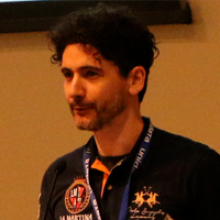Sandro Fiore

Sandro Fiore, Ph.D., Associate Professor at the Department of Information Engineering and Computer Science of the University of Trento. His activity focuses on data science, big data, scientific data management and data mining in distributed, cloud and parallel computing environments.
Over the last 15 years, he has been very active in the climate change community working at the Euro-Mediterranean Center on Climate Change (CMCC) Foundation in several national and European projects. In this respect, he has been extensively involved in various large data infrastructure projects such INDIGO-DataCloud, IS-ENES and EOSC-hub.
Over the last decade, he has been contributing to the Earth System Grid Federation (ESGF) in the context of the Coupled Model Intercomparison Project (Phase 5 and 6) dealing with petabyte-scale (open) data repositories.
He has been Visiting Scientist at Lawrence Livermore National Laboratory (PCMDI) and the University of Chicago (CS Department and GlobusLab) working on distributed data management as well as provenance and computational reproducibility in Open Science scenarios.
With respect to RDA, he has been the PI of the BARRACUDA project (pid-BAsed woRkflows foR climAte Change Using Ophidia) an RDA-Europe3 grant related to the application of the RDA recommendation on PID Information Types (PIT) to provenance-enabled big data analytics use cases for eScience.
Over the last years, he has been involved in the development of FAIR-enabled data analytics solutions for the climate domain, in the context of the EOSC-Hub and EOSC-Pillar projects.
He is author of about 100 scientific papers, editor of the book Grid and Cloud Database Management and co-author of The International Exascale Software Project roadmap. He is ACM and IEEE Member.
HOW CAN SANDRO SUPPORT YOU?
Over the last 15 years I’ve done a lot of data-centered research in various data infrastructure projects at national, European and international level, with special regard to the climate change domain. I’m very interested in Open Science & FAIR data principles and how they can contribute to deliver better science. I can support and advice on the adoption of FAIR data principles in the context of scientific data repositories with respect to data policies, data architecture, data publication and sharing, persistent identifiers, data interoperability and provenance.
